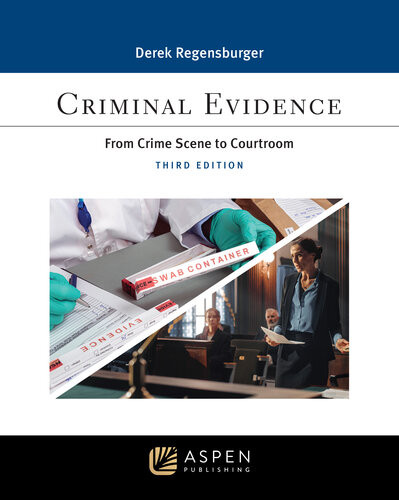

Most ebook files are in PDF format, so you can easily read them using various software such as Foxit Reader or directly on the Google Chrome browser.
Some ebook files are released by publishers in other formats such as .awz, .mobi, .epub, .fb2, etc. You may need to install specific software to read these formats on mobile/PC, such as Calibre.
Please read the tutorial at this link: https://ebookbell.com/faq
We offer FREE conversion to the popular formats you request; however, this may take some time. Therefore, right after payment, please email us, and we will try to provide the service as quickly as possible.
For some exceptional file formats or broken links (if any), please refrain from opening any disputes. Instead, email us first, and we will try to assist within a maximum of 6 hours.
EbookBell Team

4.7
96 reviewsWith lucid text, four-color illustrations, and abundant examples, Criminal Evidence follows the path of evidence From Crime Scene to Courtroom . Focusing on the Federal Rules of Evidence and their state counterparts, Derek Regensburger offers a clear introduction to the principles of evidence and instructions for collecting, preserving, and presenting evidence in a criminal case. The book surveys the major concepts of evidence law such as relevance and burden of proof, discovery, admission of expert witness testimony, impeachment of witnesses, character evidence, hearsay, authentication of physical evidence, and more. Actual trials and news excerpts bring the material to life as they illustrate the role of evidence in real cases. Videos of mock trial scenes on the book’s website reinforce students’ understanding of key concepts.
New to the Third Edition:
A new chapter on trial practice and witness preparation
Streamlined discussions of the exclusionary rule, Miranda rights, and rape shield laws
Updated material on eyewitness identification and admission of confessions, particularly the modification of the corpus delicti rule by many state courts
Changes concerning the reliability of forensic evidence due to the release of the 2016 report on the issue authored by the President’s Council on Science and Technology, including the FBI’s rejoinder to that report
New and expanded sections on bloodstain pattern analysis, arson investigation, and handwriting analysis
New and updated practical examples and Evidence in Action articles to feature more recent events, including the Kyle Rittenhouse trial
Professors and students will benefit from:
Straightforward text that follows the evidence from collection to trial
Accessible three-part organization
I. The Collection and Preservation of Evidence
II. Pretrial Matters
III. Admissibility of Evidence
Four-color photographs and exhibits that illustrate evidentiary concepts
Evidence in Action, observed in real trials and news excerpts
Practical
…